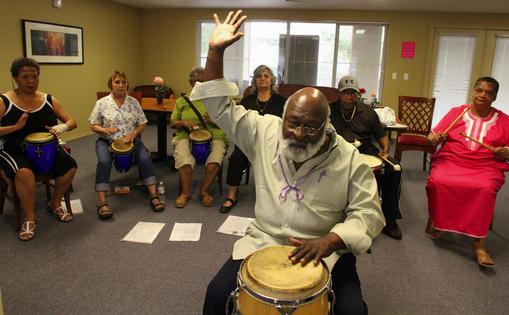Noted jazz drummer adds pizzazz to life with lessons for seniors
Published in Senior Living Features
SEATTLE - At age 76, George Griffin, a local jazz pioneer, knows drumming.
These days, Griffin lives in a housing complex for seniors of limited income. The slow movements there are a long way from the jazz clubs of his younger days.
But he's finding a different kind of reward with his fellow oldsters. He's become the music teacher to people who, in some cases, had never before touched a musical instrument.
"I can't hang out in the clubs like I used to," says Griffin. "My reward now is in seeing people play the rhythm."
Griffin was 5 when he first started banging away at cardboard boxes.
He was 16, still a junior at Garfield High School, when he was playing professionally with the Dave Lewis Combo, a legendary Northwest group.
John Coltrane. Charles Lloyd. Miles Davis.
Griffin remembers them.
In the 1960s, he was in the house band at the celebrated Penthouse club in downtown Seattle and opened for those greats.
At this particular complex, there are no assisted-living services. It is part of the Senior Housing Assistance Group for "independent seniors."
Still, Griffin says, being independent doesn't necessarily mean being active.
He says he noticed many of the residents, "sitting around doing nothing. I decided drumming might be a good thing."
Back in April, Griffin put up notices on the elevators stating that he was forming a drum line, no experience needed. They'd bang away on, mostly, miniature conga drums provided by the 208-unit complex.
Now, twice a week, about eight seniors show up in a meeting room on the second floor, and for an hour-and-a-half, the beat goes on.
It was rough going, at first.
"The neighbors said they wanted to close their doors," says Theresa Trammell, 67, retired from her various human-services jobs. "Now we're getting better, and they're opening their doors."
The way Griffin teaches them is simple: "If you can say it, you can play it."
He says, "Say, 'Mamma.' Say, 'Daddy.' Now take your hands and play it by saying it. 'Mammy' is two notes, and 'Daddy' is two notes."
The rewards for the seniors isn't just in learning a beat, whether helping them physically or just feeling a bit more cheerful after practices.
"It's helped my balance," says Eleni Vainas, 69. Making her way down stairs, says Vainas, who still does graphic design, sometimes she felt she'd topple. "Now I don't feel that anymore. I move with much more ease."
Before joining the drum line, her only music-making experience had been picking up a tambourine.
William "Speedy" Bryant, 74, who used to work heavy construction, is the only man in the drum line.
Because of arthritis in Bryant's hands, Griffin loans him the tom-tom from a drum set he owns, which is much easier to play than pounding a conga.
As to why no other men volunteered for the lessons, Bryant says, "They don't want to spend the time to learn, I guess. I thought it'd be fun. I like the satisfaction of playing and having fun."
He adds about the drum line, "And there are so many personalities."
It is certainly that_a group with personality plus.
At a recent practice, Griffin has an animated discussion with Vainas.
Griffin says about her adding an extra beat to what everyone else was playing, "You played the first one right; the rest of them are not right."
Vainas replies, "But I was hearing it correctly!" For good measure, she says, referring to how Griffin apparently mimicked her talking, "And you're making fun of my voice!"
Griffin sighs.
He says he's been trying hard not to come across so hard-nosed about proper drumming.
It is just that for him, drumming has always been so natural.
Sure, it started with cardboard boxes, and an instinct to pound away. By his teen years, he was listening to the rain hitting the garbage-can lids and finding peace in the rhythms.
Over the years, over two marriages and two daughters and a son, he always was in one group or another.
After the 1960s in Seattle, he ended up in Southern California, with his own trio, playing clubs, and working for a time in crisis intervention in a Los Angeles program for youth gangs. He was also a coordinator for the Sugar Ray Leonard Foundation.
Five years ago, Griffin returned to Seattle, where his son lives.
He didn't have much in savings but says he has no regrets.
"I made a comfortable living. I spent it on wives and homes," Griffin says. "But I'm very happy with my life. I'm very close to my family, my kids. They respect what I have done."
And he still plays professionally, with his George Griffin Trio, with gigs at various events hosted by the Senior Housing Assistance Group, and appearances at the Green Dolphin Street Lounge, which is put together on the third Friday of every month by the Central Area Senior Center. It recreates a jazz house.
"I don't do things like I used to," Griffin says about his current playing skills. "But I keep time and play fills."
Cynthia Andrews, executive director of the senior center, says of the trio, "They're great, entertaining, and George is funny. He's an old-school gentleman."
The seniors who are members of the 3G Senior Hand Drum Line_the "3G" standing for George Gentre Griffin_say they don't mind at all if their leader sometimes appears a tough mentor.
Says Trammell, "As tough as he might seem, George is very, very patient with us. When he has his moments with us, we just say, 'Take a deep breath. We're a group now.' "
School days were a long time ago for these students, but they know that there is one teacher they don't want to let down.
========
(c)2012 The Seattle Times
Visit The Seattle Times at www.seattletimes.com
Distributed by MCT Information Services
(c) The Seattle Times







Comments